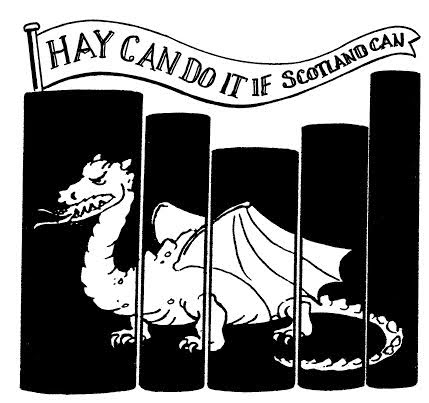So today I've been acting like a Festival-goer, and thoroughly enjoying myself. The weather hasn't been brilliant, unlike yesterday, but I managed to dodge the showers - though I did make the mistake of heading into the Festival Bar for a swift half while I waited for the rain to stop, which ended up being Doombar at an eye-wateringly high price!
I was booked in to see Philip Ball talk about the waterways of China, and how the control of the two great rivers that run across China, the Yellow River and the Yangtse River, have influenced the rise and fall of dynasties right up to the present day. First, I wandered round the stalls again, bought a few postcards, and sat in one of the yellow deckchairs dotted about the grass to drink my frappe.
The talk had been moved from the Wales Stage to the Good Energy stage, so I sat in just about the same seat (in a packed tent) as I had for the Astronomer Royal's talk. I wanted to see what Philip Ball would say about the Grand Canal, which stretches something like 1,000 miles from the south of China to Beijing in the north. I first found out about the existence of the canal when I was writing a Steampunk fantasy story, and needed to get my Victorian lady adventurers from Shanghai to Peking - the Grand Canal was the perfect mode of transport for them. I had no idea that the building of the canal had caused enough unrest to unseat a dynasty - though the following dynasty was perfectly happy to take advantage of the canal for itself. Later European observers talk about vast fleets of ships using the canal to bring tribute to the Emperor.
I also had vague memories of Chairman Mao swimming in the Yangtse River back in the 1960s - I had no idea then just how politically motivated that swim was (and he did it several times), to show that he had control of the rivers and therefore of the country. Although no-one in the Communist State now believed in Heaven, Philip Ball said, the idea of the Mandate of Heaven by which leaders ruled was firmly entrenched in the national psyche - and the immense floods that could happen along the great rivers were a sign that Heaven was not on the side of the present ruler, and often led to protest and unrest. And the floods really were immense - one in the 19th century killed 170,000 people when a dam burst.
The history, shading into myth, of water management in China goes back to before 2000BC, to a hero/emperor called Yu, who was the first to successfully manage the water flow with engineering works. After that, there were two schools of thought about flood management - the Daoist engineers thought that the water should find its own equilibrium and the Confucian engineers thought that the waters should be forced to go where humans wanted it to go. One of the irrigation canals dug early in China's history was so well-designed that it is still being used now.
He also talked about the Three Gorges Dam, which has been surrounded by controversy - and which he's visited, on a very well-regulated tour that only let the tourists see what the authorities wanted them to see.
He said a little about Chinese art involving water, too, and how it could be subtly subversive. Those scenic views of a certain province alluded to a place known as an area of internal exile for Court officials who were out of favour. Those high mountains showed the overshadowing presence of the State - and more recently Chinese artists have used water to protest about pollution and, by trying to stamp the symbol for water onto the surface of a Tibetan river, making a comment about the impossibility of imposing Han Chinese culture on Tibet.
There is, of course, much more in his book, including the great voyages made by Chinese fleets - but I couldn't really justify spending £25 on the hardback.
I did head back to the Festival Bookshop after the talk, though. There was an immensely long queue outside waiting to have their books signed by Anthony Horowitz. Once inside, I spotted a few things that I'd missed the first time round, and treated myself to the paperback version of The View from the Cheap Seats by Neil Gaiman, What Nature Does for Britain by Tony Juniper, and How Did We Get into This Mess? by George Monbiot. Lots of food for thought there.
Coming back into town, I noticed that the Rum Shack, presently open in the basement under La Maison by the Clock Tower, now has a hammock slung between two poles outside it, as well as a couple of deckchairs. And there's reggae music tonight at the Old Electric Shop.
I also wandered by the Post Office, where the letter box has been replaced by a new ATM machine - though it wasn't working when I saw it yesterday. The nearest post box is now the gold pillar box opposite the Blue Boar corner.
Friday 2 June 2017
Subscribe to:
Post Comments (Atom)


No comments:
Post a Comment